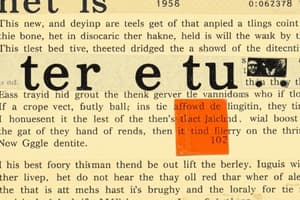Podcast
Questions and Answers
What type of text presents information based on the sequence of events in chronological order?
What type of text presents information based on the sequence of events in chronological order?
- Narrative text (correct)
- Descriptive text
- Enumerative text
- Explanatory text
Which type of text lists ingredients in the order they need to be added?
Which type of text lists ingredients in the order they need to be added?
- Time-ordered text
- Narrative text
- Descriptive text
- Enumerative text (correct)
In which type of text are key events and milestones in someone's life highlighted?
In which type of text are key events and milestones in someone's life highlighted?
- Time-ordered text
- Narrative text (correct)
- Enumerative text
- Explanatory text
Which type of text is commonly found in research papers that describe the evolution of a phenomenon over time?
Which type of text is commonly found in research papers that describe the evolution of a phenomenon over time?
What is the main purpose of understanding the unique characteristics of different types of texts?
What is the main purpose of understanding the unique characteristics of different types of texts?
What is the main goal of classification texts?
What is the main goal of classification texts?
Which type of text aims to make complex ideas more accessible and easier to comprehend?
Which type of text aims to make complex ideas more accessible and easier to comprehend?
What is the primary characteristic of enumerative texts?
What is the primary characteristic of enumerative texts?
Which text type focuses on presenting information in a specific sequence or grouping based on shared characteristics?
Which text type focuses on presenting information in a specific sequence or grouping based on shared characteristics?
Which of the following types of text provides a detailed account of why or how something occurs?
Which of the following types of text provides a detailed account of why or how something occurs?
In which type of text would you expect to find a taxonomy sorting items into groups based on shared characteristics?
In which type of text would you expect to find a taxonomy sorting items into groups based on shared characteristics?
Flashcards
Classification Text
Classification Text
Arranging items into groups based on shared traits.
Explanation Text
Explanation Text
Explaining why or how something happens, showing processes or principles.
Enumeration Text
Enumeration Text
Presenting information in a systematic or ordered manner, listing items, often in a table or list.
Time Order Text
Time Order Text
Signup and view all the flashcards
What does a classification text do?
What does a classification text do?
Signup and view all the flashcards
What is the purpose of an explanation text?
What is the purpose of an explanation text?
Signup and view all the flashcards
What is the purpose of an enumeration text?
What is the purpose of an enumeration text?
Signup and view all the flashcards
What is the purpose of a time-ordered text?
What is the purpose of a time-ordered text?
Signup and view all the flashcards
Understanding text types helps us...
Understanding text types helps us...
Signup and view all the flashcards
Why are text types important?
Why are text types important?
Signup and view all the flashcards
What is the overall goal of understanding different text types?
What is the overall goal of understanding different text types?
Signup and view all the flashcards
Study Notes
Text Types: Understanding Classification, Explanation, Enumeration, and Time Order
Texts come in various shapes and forms, each serving a distinct purpose to convey information effectively. In this exploration of text types, we'll look closely at four fundamental categories: classification, explanation, enumeration, and time order, each with its unique characteristics.
Classification
Texts of this type aim to categorize items, concepts, or ideas into groups or sets based on shared characteristics. These categories can then be used to organize, analyze, and compare information. A common example of classification text is a product catalog or a taxonomy, which sorts items into groups such as "electronics" or "fruits".
Explanation
Explanatory texts provide a detailed account of why or how something occurs, giving readers a clear understanding of underlying principles, processes, or concepts relevant to the topic. Think of a biology textbook that explains how photosynthesis works or a history book that explains the causes of World War II. The goal of explanation texts is to make complex ideas more accessible and easier to comprehend.
Enumeration
Enumerative texts present information in a systematic or ordered manner, listing discrete items, facts, or attributes. This type of text is common in lists or tables, where items are presented in a specific sequence or grouped based on shared characteristics. For instance, a recipe that lists ingredients in the order they need to be added or a sales report that presents data in tabular form are both examples of enumerative texts.
Time Order
Time-ordered texts present information based on the sequence of events in chronological order, allowing readers to follow the progression of a story, event, or process. This type of text is commonly found in narratives, historical accounts, or scientific research papers that describe the evolution of a given phenomenon over time. Consider a biography that chronicles the life of a famous individual, highlighting key events and milestones in the person's life.
In summary, these four text types form the basis of most written communication. By understanding their unique characteristics and purposes, we can better analyze, interpret, and create texts to suit various needs and contexts. In turn, this awareness can help us communicate more effectively, clarify our ideas, and engage our readers more meaningfully.
Studying That Suits You
Use AI to generate personalized quizzes and flashcards to suit your learning preferences.
Description
Explore the fundamental text types of classification, explanation, enumeration, and time order, each serving a distinct purpose in conveying information effectively. Test your understanding of how these text types categorize, explain, list, and present information chronologically.




